Technological breakthrough may be key to overcoming current 5G network limitations

Researchers from Bangor University’s Digital Signal Processing Center (DSP) have made a breakthrough in the development of a novel Point-to-Multipoint (P2MP) Optical Transceiver.
Optical Transceivers are widely used in data communication systems to transmit and receive signals over a network. The novel P2MP flexible transceiver overcomes the limitations of previous technologies in terms of just operating at pre-defined speeds over point-to-point transmission systems only.
As a direct result of the disadvantages associated with traditional optical transceivers, a current network node accommodating P2MP 5G access networks must use multiple traditional point-to-point (P2P) optical transceivers in parallel, each supporting a dedicated transmission link. Such network implementation and operation approaches are spectrally inefficient, energy-hungry, expensive and non-scalable in terms of meeting the stringent requirements of future access networks, including 5G-Advance and beyond.
To address these challenges, Bangor University researchers leading the way in DSP technology have turned their attention to point-to-multipoint (P2MP) transceivers, which have shown promise in offering scalable, flexible, and cost-effective solutions capable of supporting multiple low-speed optical transceivers to communicate with a single high-speed optical transceiver for cost-sensitive application scenarios. The transceivers can automatically and dynamically “grow” or “shrink,” depending on the network traffic status.
These findings were recently presented in the Journal of Lightwave Technology, which is published by the Institute of Electrical and Electronics Engineers.
Dr. Wei Jin, one of the co-authors of the paper from Bangor University’s School of Computer Science and Electronic Enginerering said, “The breakthrough in P2MP transceiver technology presented in our research paper holds tremendous potential for revolutionizing existing optical access networks by transforming their virtual network topologies from P2P to P2MP in a scalable, flexible, low latency, and cost-effective manner.
“Compared to traditional transceivers, the reduction in transmitter digital signal processing complexity, improved spectral efficiency, and enhanced network security also make this solution highly promising for the future of optical access networks. As we continue to refine and optimize this technology, we can look forward to a new era of efficient and adaptable optical access networks that meet the growing demands of our interconnected world.”
More information:
Lin Chen et al, A Point-to-Multipoint Flexible Transceiver for Inherently Hub-and-Spoke IMDD Optical Access Networks, Journal of Lightwave Technology (2023). DOI: 10.1109/JLT.2023.3249406
Citation:
Technological breakthrough may be key to overcoming current 5G network limitations (2023, August 8)
retrieved 16 September 2023
from https://techxplore.com/news/2023-08-technological-breakthrough-key-current-5g.html
This document is subject to copyright. Apart from any fair dealing for the purpose of private study or research, no
part may be reproduced without the written permission. The content is provided for information purposes only.
For all the latest Technology News Click Here
For the latest news and updates, follow us on Google News.

